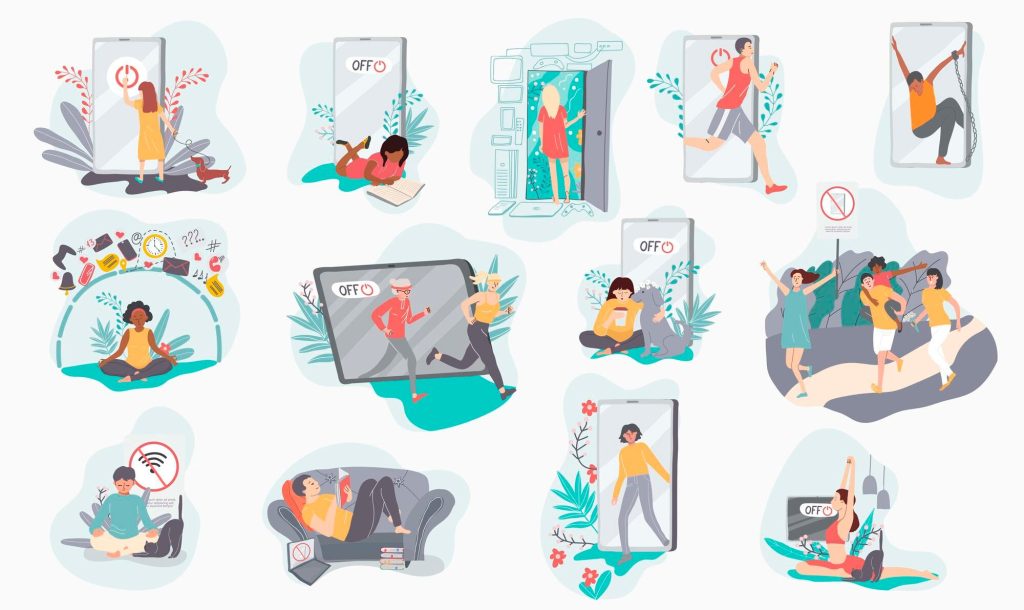In today’s digital world, it feels almost impossible to avoid constant notifications, messages, and the need to check social media. With the world at our fingertips, the fear of missing out is real, and for many, unplugging without feeling left out seems like an impossible task. The idea of disconnecting from digital devices can feel intimidating, but it’s crucial for mental and emotional well-being.
Here’s the good news: unplugging doesn’t have to mean cutting yourself off from everything. You can still stay connected to what matters most while taking intentional breaks from technology. In this guide, we’ll show you how to unplug without feeling left out, allowing you to balance the benefits of digital engagement with the crucial need for downtime.

Why Unplugging is Essential for Your Mental Health
The constant connectivity we experience today can have a significant toll on our mental health. In fact, unplugging without feeling left out can be key to maintaining a healthy relationship with technology and ensuring mental clarity.
1. Mental Health Benefits of Unplugging
Unplugging from technology can have direct benefits on your mental health. Studies have shown that constant digital engagement can lead to increased anxiety, stress, and a feeling of being overwhelmed. By stepping back, even for short periods, you can reduce mental fatigue and promote relaxation (American Psychological Association, 2023).
2. Sleep Improvement
Excessive screen time, particularly before bed, can disrupt the production of melatonin, making it harder for you to fall asleep. Unplugging without feeling left out in the evening allows you to enjoy better sleep, leading to increased productivity and better emotional well-being (Harvard Health, 2023).
3. Strengthening Relationships
Another benefit of unplugging is the chance to focus on in-person relationships. When we constantly check our phones or computers, we miss out on the opportunity to engage meaningfully with the people around us. Taking a break from digital devices allows you to focus on what really matters—your personal connections (Psychology Today, 2023).
How to Unplug Without Feeling Left Out
Now that we understand the benefits, let’s dive into practical strategies to unplug without feeling left out.
1. Set Boundaries for Screen Time
One of the easiest ways to unplug without feeling left out is to set boundaries around your screen time. You don’t have to completely disconnect from all technology; instead, aim to use it intentionally. This can mean checking emails only at specific times of the day or designating specific periods to engage with social media, limiting distractions and fostering mindfulness.
2. Curate Your Social Media Experience
Social media can often contribute to feelings of stress and inadequacy. Instead of mindlessly scrolling, focus on curating your social media experience to reflect your interests and values. Follow accounts that uplift you and unfollow or mute those that add to the feeling of “missing out.” By unplugging without feeling left out, you can still engage meaningfully with the content that matters while avoiding unnecessary distractions.
3. Embrace Offline Hobbies
Engaging in hobbies that don’t involve screens is an excellent way to unplug without missing out. Whether it’s painting, reading, gardening, or learning a new skill, offline hobbies allow you to focus on something other than technology. You may find that these activities help you feel more fulfilled and content, reducing the temptation to check your phone (American Psychological Association, 2023).
4. Schedule “Social Media Detox” Days
If you’re hesitant about unplugging, try committing to a social media detox day. Choose one day a week where you disconnect from all social platforms. You might feel anxious at first, but you’ll quickly realize how freeing it can be. On this day, focus on offline activities that nourish your mind, body, and soul, rather than feeling the pressure to check updates and notifications (NPR, 2023).
5. Stay Informed with Offline Media
If you’re concerned about missing important news or updates, consider engaging with offline media. Read newspapers, magazines, or listen to podcasts instead of constantly checking your phone. These activities allow you to stay informed while helping you unplug without feeling overwhelmed by endless information (Harvard Business Review, 2023).
6. Establish Technology-Free Zones
Create designated technology-free zones in your home, such as during meals or in your bedroom. This simple habit allows you to foster more meaningful connections with family and friends and creates space for relaxation. By establishing clear boundaries, you can unplug without feeling disconnected from your immediate environment.
Embracing Balance: Unplugging Without Missing Out
The goal of unplugging without feeling left out is not to shut yourself off from the world, but to find balance. Taking regular breaks from screens can help reduce stress, improve mental health, and lead to more meaningful real-world connections. By following the strategies mentioned above, you can experience the benefits of unplugging without sacrificing your connections or engagement with the world.
So, take a step back, create your boundaries, and embrace the freedom that comes with unplugging—without feeling like you’re missing out.
References:
- American Psychological Association (APA) (2023) The Stress of Being Always Plugged In. Available at: https://www.apa.org (Accessed: 29 April 2025).
- Harvard Health Publishing (2023) How Technology Affects Our Sleep and Mental Health. Available at: https://www.health.harvard.edu (Accessed: 29 April 2025).
- Psychology Today (2023) How to Manage Stress from Technology Use. Available at: https://www.psychologytoday.com/articles/stress (Accessed: 29 April 2025).
- Harvard Business Review (2023) The Art of Managing Social Media and Digital Communication. Available at: https://hbr.org (Accessed: 29 April 2025).
- NPR (2023) How Hobbies Improve Mental Health and Well-being. Available at: https://www.npr.org (Accessed: 29 April 2025).









